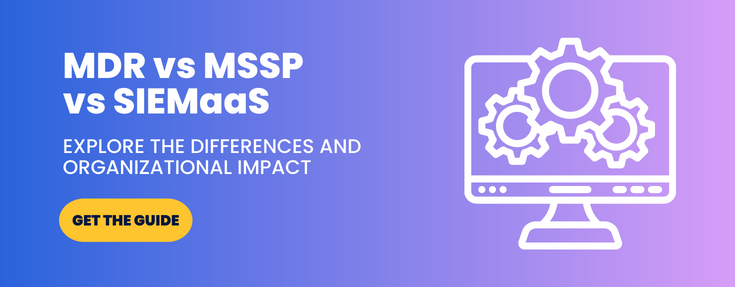Cybersecurity Partner Or A Ticket Number?

 By
Jason Miller
·
3 minute read
By
Jason Miller
·
3 minute read
Is your business being treated like a cybersecurity partner… or a ticket number?
When considering how your managed SIEM service treats you as a customer, try this… imagine that you’re taking a college class.

Scenario 1: you’re in a giant lecture hall. The students are crammed in, but you can find a seat toward the back. The professor is so far away you can’t make out much more than the glare from his bald head. You have questions during the lecture, but he doesn’t see your raised hand. Or doesn’t care. You take notes and try and do your best to keep up.

Scenario 2:
You’re in a small class. The professor takes the time to introduce himself and learn the names of you and your classmates. He answers your questions as you have them, and even takes the time to help guide you through some of the concepts 1-on-1 to make sure you understand and are comfortable with the material he covered.
In one class, you’re just a number… one of a giant mass of students. In the other, you have a dedicated partner to guide you.
Which class would you want to attend?
Why Partnership Matters With Managed SIEM Services
Now, let’s take that principle and apply it to your cybersecurity provider. Do you want a company to treat you like just another support ticket number, or do you want a partner who knows you and helps to communicate the nuances of their security offerings to you?
Not only is the partner approach more attractive from a customer experience standpoint, it actually impacts your level of security as well.
Think about it: you touch certain files every day. You have patterns of behavior that we can determine and measure. It’s your company’s unique data fingerprint.
If your SIEM as a Service provider doesn’t bother to learn the context of your business, or the context of your behavior, how are they determining what anomalous traffic on your system actually is?
That’s why you need a managed SIEM service that listens to you and learns your needs. Basic technology, without a relationship to understand context, will lead to false alerts and false positives.
A mature managed SIEM focuses on threat management as well as monitoring. The SIEM is being used by experts who understand the context of your business, and can thus act appropriately toward potential threat that occurs on your system.
Working with a partner means that you can collaborate with your SIEM provider and adapt your security to fit your needs as they happen.
Is Your Managed SIEM Service Provider A Partner?
If your managed SIEM service does not treat you like a partner, you are just another number in a support queue. And that means none of the specialized context necessary for running a mature SIEM security solution.
A SIEM service focused on generic monitor-and-response is just observing the SIEM software, and relying on the software to do the threat detection heavy lifting. And software, like any tool, is only as good as the person who’s using that tool.
If you’re worried that your managed SIEM service is treating you like a number, not a cybersecurity partner, ask yourself the following questions:
When’s the last time you got a phone call from your cybersecurity provider?
Do you ever get a personal call to discuss elements of your systems? Conversations about odd activity? Even a monthly call to check in? If all you receive are emailed reports, you’re probably just another task on their to-do list.
Have they ever asked you about changes to your network activity?
If you’ve changed elements of your system, be they hardware, software, or even personal behavior- they will make an impact on your overall data network. If your managed SIEM service doesn’t care about important security changes, they may not care about you.
When’s the last time your security company came to you with challenging questions about your network?
A good cybersecurity provider will push you to make the changes that will keep your network secure. If you never receive recommendations or pushback for how to improve your system, your SIEM provider may not be invested in your security optimization.
Do they collaboratively work to improve your systems and establish a road map for success?
A partner works with you to continually improve, to make things better and help you achieve goals down the line. If your security company is satisfied with alerting you to problems without helping you achieve solutions, you may not be working with a cybersecurity partner.
Complete Security Needs A Relationship
Providers that treat you like a number provide disjointed service. They don’t understand the nature of threats, why they matter, or how to prevent those threats from happening… all because they don’t take the time to understand the context of your business.
At BitLyft Cybersecurity, we partner with all of our clients to make sure their security needs are met; not only for today, but for the many days to come.
We proactively seek out threats to remediate and ways to keep your system secure and compliant, so your IT department can focus on keeping your business systems running smoothly.
Sign up for a free demo, and let us show you what we can do. We’d love to chat about partnering with you and keeping your business systems secure.\

